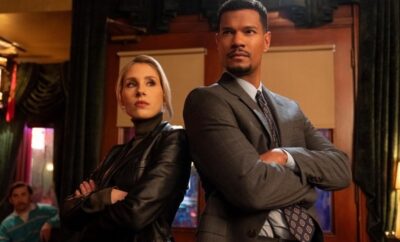Features
Ramy: Why You Should Be Watching Hulu’s New Comedy
By: Ashlee Dell’Arciprete
Hulu’s upcoming new series, Ramy, has all of the makings to be a great comedy. In a nutshell, Ramy is a unique portrayal of the life of a young first-generation Egyptian-American Muslim living in a politically-divided New Jersey neighborhood who is trying to find the balance between faithfully following his religion and being a millennial in 2019. Ramy Hassan (creator/EP/writer Ramy Youssef) struggles throughout with how to balance his personal life with his religion and finds himself questioning both. The new Hulu series has several qualities that make it stand out as the next show to add to your watchlist, especially if this is the first time you are seeing yourself represented on screen. Keep reading to learn more about Ramy and why you should be watching it.
First, the comedy is loosely based on Ramy Youssef’s life. If you are unfamiliar with his work, Youssef is a stand-up comedian and actor also from New Jersey and, like his character in the series, is a first-generation Egyptian-American Muslim. Ramy made his television stand-up debut on The Late Show with Stephen Colbert, which is nearly at one million views on YouTube. Youssef’s background is in comedy, but he has also acted previously in, most notably, a short recurring role in the third season of Mr. Robot, and as a series regular in See Dad Run. Youssef’s writing and acting is great in Ramy, which makes sense with his comedy background.
Another reason to watch is fellow EP and seasoned comedian Jerrod Carmichael. Carmichael teams with former Mad Men staff writer Bridget Bedard with the series produced by A24. Ramy Youssef sold Ramy to Hulu, which he also co-wrote with Ari Katcher and Ryan Welch. Ramy was given a series order by Hulu last year as a 10-episode single-camera comedy that are only around 30-minutes long. The series also premiered at this past SXSW Film Festival in March.
Ramy has great representation in a time where it is needed. Although the 28-year-old Youssef is a stand-up comedian, he avoids using this storyline in exchange to tell a more impactful one about representation and lack thereof. Beginning with the pilot, you are instantly able to tell how much Ramy deeply respects his parents and their Muslim faith. Ramy’s parents in the series, and in real life, immigrated from Egypt and live in a politically-divided suburban neighborhood.
Further, Ramy does not ignore his faith nor is he ashamed of it. He admires his parents’ strong relationship with their faith, which is a huge difference that sets Ramy apart from the only other mainstream series. Ramy, on the other hand, admires how strong his parents are and the positive outlook they are able to always have because of their faith, while he is having a crisis with his. Sure, his parents can be strict (like requiring that their children keep their bedroom doors open at all times), but Ramy completely respects them and all that they’ve worked towards. Ramy’s faith, individual experience and struggles with both are actively present throughout the series.
Another unique part of the series is its millennial perspective. Ramy wants to be a good Muslim and struggles with how to do so in millennial culture. For instance, he still lives at home. Yes, he occasionally embraces some parts that lend to a “millennial lifestyle,” but he does not partake in alcohol or recreational drugs. Everyone but his short-lived girlfriend (played by PEN15’s Anna Konkle – a Hulu Easter egg) seems, for the most part, to always to respect and revere the rules set forth by him or his Muslim faith. This especially becomes a struggle that Ramy deals with during the holiday of Ramadan, which is observed worldwide by Muslims as a month of fasting. In the episode exploring Ramadan, titled “Do the Ramadan,” Ramy reveals he was not fully committed to holiday the previous year and wants to follow it correctly this time around. You’ll have to watch to find out how that went.
Likewise, several episodes are very powerful in their ability to create conversation for broad audiences. Episode 4 titled, “Strawberries” is a flashback perspective that focuses on Ramy’s childhood. While it initially covers a very different topic, about halfway through the episode it is revealed that it is occurring during the tragedy of 9/11 in the perspective of a Muslim-American child. Given Youssef’s current age, the episode shows a young Ramy at around 10-years-old, one old enough to be aware what had happened yet not old enough to be able to endure the hateful Islamophobia that would come from it for someone his age – especially with the series taking place in the tri-state area. Of course, with the nature of the show, a comedic take is put on it and 9/11 is not in center stage. However, this episode of Ramy shows the tragedy that day in the eyes of a young Muslim American – a point of view that has rarely, if ever, have been able to be shared to a mainstream audience.
What Ramy also nails are the characters. Even beginning with the pilot, titled “Between the Toes,” specifically has great character development as it begins to explore each main character. The script and the characters are then further developed the season progresses with each person having their own distinct voice. Throughout the series there are several spinoff episodes that do not center on Ramy and instead focus on those close to him in his life, giving each character their own spotlight. Some standouts were Ramy’s best friend, his sister and his parents.
For instance, the dynamic bond between Youseff’s character and his best friend will draw you in and make you wish you had an unapologetic friendship like theirs. At the start of the series Ramy is working at a failing startup with his best friend Steve (played by real life pal Steve Way) who often has the funniest lines and will become one of your favorite characters as you progress in the series. Steve was born with muscular dystrophy and is played by an actor who is disabled, which unfortunately is still rare in film and television today. Steve’s differences are also never exploited for the story. Every scene between Ramy and Steve is great while being cringey at times, but all-around hilarious. Way is also an advocate for disability awareness, helping to make Ramy even more special.
In addition to Steve, a later poignant episode of the series focuses on Ramy’s parents and the judgment they received from their parents for immigrating to the United States to raise their children. Ramy’s mother Maysa (Hiam Abbass, Succession) and father Farouk (Amr Waked) genuinely love and care about their children and it shows. On top of this, Ramy’s parents are finding their way as well. Maysa is trying to find a place she fits into in her community while his dad is trying to fulfill the wishes of his own father. Abbass is great in this role. She even, at one point, hilariously tries to become a rideshare driver to occupy her time. Five stars for effort!
Additionally, the sixth episode in particular focuses on Ramy’s sister, Dena (May Calamawy), who also lives at home with the family. This episode is a standout because their parents are much stricter with her, especially when it comes to dating. This sheds a bright light as to how women can be treated differently than men in the Muslim culture. At one point, Dena is scolded for leaving the house with her hair straightened and another for closing her bedroom door. She points out a few times how her parents treat her brother differently as they don’t ask Ramy where he goes when he heads out or attempt to control his hairstyles. The relationship between Dena and Ramy is also great and just fun to watch. May Calamawy has great comedic delivery as well.
Finally, what makes the series stand out is the Muslim characters on the show are actually played by Muslims actors, which again is sadly rare as well. And, yet, even the supporting cast is still given their own unique voices. Ramy’s friends Ahmed (Dave Merheje) and Mo (Mohammed Amer), his parents and his Uncle Naseem (Laith Nakli) each bring different experiences to the series that can be relatable to some and informative for broad non-Muslim audiences.
In addition, although it is not a complete biographical story, Ramy said in an interview at SXSW with Vanity Fair that, “This is my point of view. There will be parts that Muslims love; there will be parts that they don’t like” and continued that broader audiences as well will feel the same way. However, Youssef also “[hopes] that there’s a willingness to embrace this.” We hope that with Ramy and after the success of Hulu’s other comedy, the recently released Aidy Bryant show Shrill, this hopefully foreshadows more varying voices and backgrounds to be heard.
Ramy is a timely and a necessary series that we’re excited to see be told. For many, this may be your first time feeling truly represented on screen and for others it may be an eye-opening series into experiences other than your own. Overall, from the character development, to the writing, overarching themes of family dynamics, questioning faith and the coming-of-age path taken by Ramy the show is able to accomplish a lot. The series gives a unique point-of-view that is rarely shown to mainstream audiences in a time where more representation is needed in film and television. It is a point of view that deserves to be told, all while being genuinely funny.





You must be logged in to post a comment Login